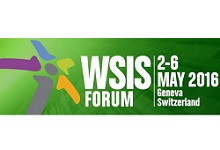Establish an inclusive, shared and open information environment, rensure all enjoy information civilization
5 May 2016 09:00h
Event report
[Read more session reports and live updates from the WSIS Forum 2016.]
Moderator, Ms Ping Wu (Internet Society of China) gave a short introduction about the focus of the session. The Tunis Agenda for the Information Society indicates everyone can benefit from the opportunities information communications technologies (ICTs) can offer. This session aimed to show different examples, such as China’s, of how everyone can benefit with communication facilities construction and information accessibility, especially with a focus on persons with disabilities, through access to information and knowledge, an enabling environment, ICT applications like e-learning, ethical dimensions, and international and regional cooperation.
The working part of the session was opened by the UNESCO representative who talked about UNESCO’s overall mandate to build peace through education, science, culture, and information. He pointed out that some countries are staying far behind inclusivity. This can be changed in the future by working together in partnership with government, civil society, and the private sector. The goal is to achieve full realisation of freedom of expression and other human rights. Focusing on persons, with disabilities he stressed that ‘we cannot talk about inclusion if we are leaving these people out.’
Recent developments in technology should to be used by different people, and new applications are being created to provide education for all. He concluded that the focus needs to be on accessible and inclusive ICTs and education.
All panellists agreed that it is essential for information to be accessible, especially for people with disabilities. Everyone should benefit from opportunities. Examples of promotion of public education from Ruanda and Uganda were mentioned, as well as great benefits of distance learning for both students and teachers. ICTs are characterised as the most powerful tools to have universal access to education and knowledge.
Mr Chang Huang (Deputy Director, China Information Accessibility Public Service Platform) mentioned that China carrying out policies, standards and laws, and regulations to enhance international communication and cooperation. This is helping people with disabilities to gain public benefits, and including them in social, political and economic life.
Mr Edmond Keung (Deputy General Manager, Information Technology) talked about special kind of programmes for elderly, giving an example of China’s government giving money and asking NGOs to refurbish computers. They were given to low-income families and kids at school, along with free education on how to use them. He also emphasised the importance of other training. One is for mentally challenged persons on how to use computers, which helps them also develop a hobby. The second is for grandparents and grandchildren who are trained together which helps them bond through education.
Different best practice cases of ICTs were mentioned by panellists. The number of so-called invisible youth, the suicide cases of youngsters, was very high in the last few years. Specialised NGOs have started working with and are virtually reaching out to these young people as this is the only way for them to open up. This type of online counselling has had good results in many cases.
Ms Gunela Astbrink (the Principal of GSA) mentioned that 80% of people with disabilities live in developing countries, and many of them have limited access to education and employment opportunities. She concluded that people with disabilities are doubly disadvantaged, also from a cultural point of view.
At the end, everyone agreed there is still a lot of work to be done on building awareness, to support gradual cultural change. It is important to create accessible services and websites, but what is more important is to include people with disabilities in the whole process of planning with the motto: Nothing about us without us!
by Aida Mahmutovic
Related topics
Related event

